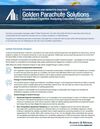Merger & Acquisition
When contemplating a transaction involving a merger or acquisition, companies are faced with a myriad of Human Resources (HR) and Compensation and Benefits (CAB)-related tax issues. The professionals at Alvarez & Marsal (A&M) are uniquely positioned with broad expertise to help navigate complex issues and reach optimal results, whether buying or selling a business.
280G/Golden Parachutes
The golden parachute rules under section 280G of the Internal Revenue Code can impose harsh penalties on executives and companies, if not properly considered. These include a 20 percent excise tax on the executive and a lost deduction for the company. A&M is equipped to perform the necessary calculations and provide support to legal counsel to minimize or eliminate the negative impact of these rules
Equity Plans and Outstanding Awards
Existing equity plans can present unique issues in connection with a transaction, such as:
- How will existing awards be treated? Will they be cashed out, rolled into a new company, or handled in some other way?
- How would alternative awards impact the company’s tax and financial accounting?
- How should equity awards be structured to lead to more favorable treatment from a tax and accounting perspective?
Seller and Buyer Due Diligence
When selling a company, investors should perform a thorough diligence process to investigate and analyze the company’s HR and CAB issues. This allows sellers to anticipate and address any issues that may be identified, without being blindsided by the buyer’s diligence process. This is one way that sellers can preserve value in their companies.
- Buyers should also perform a robust analysis of the target company and any potential liabilities. A number of issues should be considered, such as: Qualified retirement plans (i.e., 401(k) and pension plans), including any potential hidden liabilities, which in some cases can be substantial, and how such plans should be addressed in connection with the transaction
- Nonqualified deferred compensation plans, including whether they have been maintained and administered consistent with legal requirements, and alternatives for dealing with them in connection with the transaction
- Health and welfare plans, including HIPAA (Health Insurance Portability and Accountability Act) and ACA (Affordable Care Act) compliance, as well as whether the existing plans are competitive in the market
- Payroll compliance issues including reporting, withholding, and filing
- Outstanding loans to employees, including how they will be addressed and the applicable tax impact
- Compensation liabilities that may be triggered upon the transaction (like bonus payouts) or carried over to the acquirer
Benefits Integration
In connection with an acquisition, buyers should determine how acquired employees will be integrated into the company, both from a payroll and benefits perspective. Determinations regarding integration of health and welfare and retirement benefits should be made in advance of any closing and should be considered early in the process. A&M’s professionals have the experience and technical knowledge necessary to assist in addressing integration of retirement, welfare, and incentive programs as well as experience in streamlining and standardizing benefit packages.
HRIS and Other Systems Implementation
HRIS (Human resources information system) integration always seems to generate headaches in connection with a transaction, especially when there are different providers on each side of the transaction. Often, they have different processes and data requirements. A&M has the expertise to assist in selecting vendors for HRIS/payroll and equity plan administration providers through robust RFP and vendor selection processes.
Compensation
In addition to benefits and systems integration, variances in compensation philosophies and structures among merger partners can present thorny issues with respect to go-forward compensation. This might include differences not only in regular pay, but also annual bonus and long-term incentive plans, including the degree to which each element of compensation comprises total pay.
Our professionals have experience developing standardized compensation philosophies, which often includes peer group development and benchmarking that considers not only cash compensation (i.e., base pay and bonus) but also long-term incentives (most often provided in the form of equity awards).
Since perception is often critical to a successful program rollout, A&M also helps clients clearly and effectively communicate these programs to their employees.
Workforce Planning
Quite often, a transaction will result in workforce redundancy, particularly for executive and non-operations personnel. A&M has experience developing effective approaches to optimizing the combined workforce. Our professionals can also assist clients in addressing issues such as severance and other post-termination benefits using a reasoned, market-based approach.
IPO Support
Companies that are contemplating an initial public offering will also have numerous compensation and benefits issues that must be considered; A&M has the experience and know-how to help companies prepare for a public offering by implementing market-competitive compensation and incentive programs. Our IPO services are described in more detail here.
Learn More

Learn more about A&M’s Golden Parachute Services



